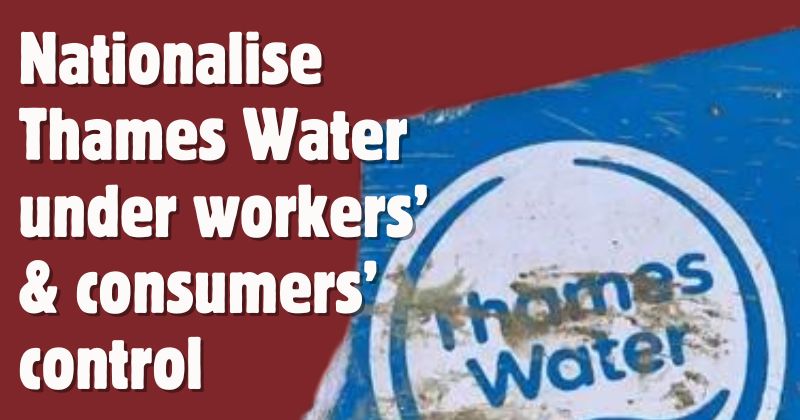

By Andy Yorke
The bosses’ arguments about investment don’t hold water. They have sucked out billions in dividends whileconsumers pay the price. Nationalisation under workers’ and consumers’ control is the way forward.
PRISONS FULL to bursting, steel closures and now Thames Water’s possible collapse, Starmer could barely open the door to 10 Downing St due to the pile of old bills due and final warning letters left by his predecessor’s tenure. Looking back, Sunak’s government did little more than postpone the results of 14 years of brutal Tory austerity that has left Britain’s industry, infrastructure, housing, public services and finances in tatters—but with many more millionaires.
The water industry, privatised by Thatcher in 1989 in England and Wales, exemplifies the rotten relationship between private profit and deteriorating public services better than most. Thames Water, which has 16 million customers in London and the Southeast, nearly one out of five in Britain, is the most indebted company with £15.6bn debt, while the whole sector is groaning under £60bn debt.
Debt balloons and bonus bonanzas
Most people will scratch their heads to hear that in the same time it took to amass these huge debts, which 10 English and Welsh private companies are demanding huge hikes in our water bills to offset, the boards and shareholders of these companies have awarded themselves £78bn in dividends and more in bonuses for top execs.
Thames Water faces bankruptcy, yet it has just awarded another £158.3 million in dividends to its holding companies. Its CEO Chris Weston received a £195,000 bonus this year, and the Chief Financial Officer Alistair Cochran a £446,000 bonus, despite the number of sewage discharges doubling to 16,990 in the last year. Yet it has demanded the tame regulator Ofwat allow it to raise bills by nearly half to £627 a year by 2030.
The cocky CEO attempted to justify this by saying such obscene bonuses were necessary to ‘attract the right talent’, while finger-wagging any plans to renationalise Thames Water as ‘hurting taxpayers’! Why’s he so confident? Because he knows they have Labour over a barrel of its own making. Starmer and the new ‘Iron Chancellor’ Rachel Reeves, dedicated to not raising taxes or spending, do not want the bank-busting headache of having to bailout Thames Water, nor to risk alienating big business and the City with even a temporary renationalisation.
On 12 July, Ofwat published its draft review of the English and Welsh water companies’ business plans for 2025–30, agreeing that they could raise bills by an average of £94 over the next five years—even that is a third less than the arrogant water bosses had demanded! But why should we pay? Confiscating their profits and taking the companies back into public control is the only way to lower bills and replace crumbling infrastructure.
Workers’ control
Free-market economists’ claims about the efficiency of privatisation don’t hold water. We have seen in practice that the system is engineered to make profit regardless of the costs to the public and workers.
First, the Tories restricted the 10 regional public water providers from borrowing. Then, pointing to the lack of investment in upkeeping and developing the infrastructure of reservoirs, pipes and treatment centres, they sold it off, effectively for free. The £7.6bn selloff was enabled by the state taking over the sector’s £5bn debt—socialising the losses—and a £1.5bn ‘green dowry’ of public funds to start them off, setting up debt-free monopolies, with each company controlling a region with a captive customer base and hugely valuable, and underpriced, assets.
To pump up profits the firms neglected investment to upgrade infrastructure, instead slashing staff and hiking prices, which have risen by over 50% since privatisation, not taking into account Ofwat’s next 21% hike. Crucially, they have loaded the companies with debt to fund their fat dividends, using their huge assets and guaranteed customer-base as leverage. Even more complex ‘financial engineering’ may mean that some of the debt is owed to their ‘sister companies’—two bites at the profits cherry.
Ofwat, always going to bat for the industry, claims again and again that only the private sector could have delivered £150bn (inadequate) investment since privatisation. But a Greenwich University study showed that all that could have been funded by the profits taken out without accruing any debt. Instead, customers have been left paying £2.3bn more a year than they would have, over half of which is just to service these debts.
By 1998 English companies were already making an astounding 46% average profits, several times the norm in other countries. The bosses have rinsed us for billions, while leakages from the crumbling Victorian pipes and sewage plants waste water and pollute our rivers and beaches.
Labour’s promises to end bonuses for polluting water bosses and prison sentences for ‘repeat offenders’ are completely inadequate, as is any scheme for temporary renationalisation where again the public swallows the debt and costs, while a company is kitted out for the parasites to profiteer once again. Renationalisation must be carried out under workers’ and consumers’ control, and all the debts must be cancelled.
Labour argues it would cost too much to buy out shareholders, but they’ve had enough compensation—£78bn and counting. The companies should be expropriated without a penny paid to the profiteers and the billionaires heavily taxed to fund the hundreds of billions needed in investment.